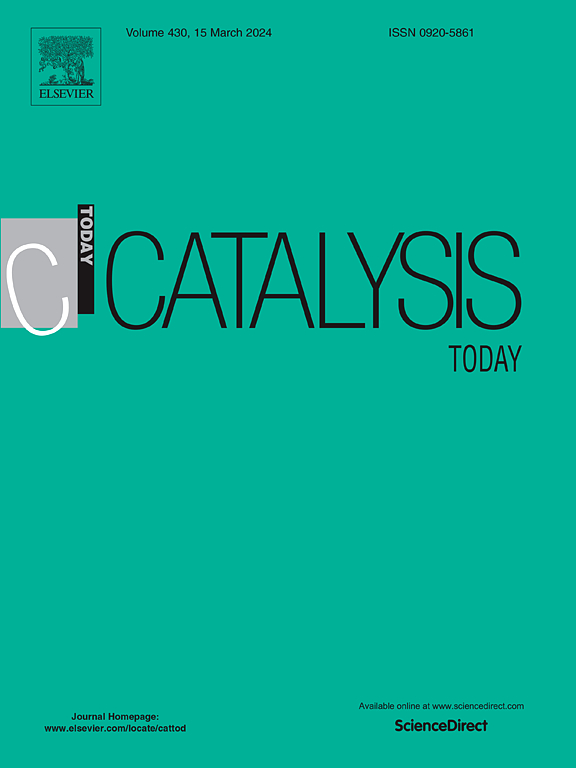Copper-decorated Biochar derived from sludge as eco-friendly nano-catalyst for efficient p-nitrophenol reduction
IF 5.2
2区 化学
Q1 CHEMISTRY, APPLIED
引用次数: 0
Abstract
In the present study, Biochar produced from municipal sludge was used as support for copper nanoparticles (Cu NPs) to develop an efficient catalyst for environmental remediation and resource recovery. The catalytic reduction of 4-nitrophenol (4-NP) to 4-aminophenol (4-AP) with NaBH4 was chosen as a benchmark reaction to evaluate the performance of the catalyst. This reaction is significant as it converts a toxic pollutant into a valuable intermediate with applications in pharmaceuticals and fine chemicals. Biochar-supported copper catalysts (Cu/Biochar) were synthesized with different Cu loadings (1, 2.5, 5, 7 and 10 wt%). Among these, 5.5 %Cu/Biochar showed good catalytic activity, achieving a 97 % reduction of 4-NP to 4-AP in eight minutes, with an apparent rate constant (Kapp) of 0.0045 s−1, using only 4 mg of catalyst. The catalyst demonstrated excellent stability and reusability for five consecutive cycles. Comprehensive characterization of the 5.5 %Cu/Biochar catalyst was performed using XRD, SEM-EDX, TEM, FTIR, TGA, and pH at the point of zero charge (pHₚzc). The results confirm that Biochar serves as an effective, low-cost, and sustainable support, enhancing the catalytic performance and stability of Cu NPs.
污泥中铜修饰生物炭作为高效还原对硝基苯酚的环保纳米催化剂
本研究以城市污泥为载体,利用生物炭制备铜纳米粒子(Cu NPs),开发出一种高效的环境修复和资源回收催化剂。以NaBH4催化4-硝基苯酚(4-NP)还原为4-氨基苯酚(4-AP)为基准反应,评价催化剂的性能。该反应意义重大,因为它将有毒污染物转化为有价值的中间体,可用于制药和精细化学品。合成了不同Cu负载量(1、2.5、5、7和10 wt%)的生物炭负载铜催化剂(Cu/Biochar)。其中,5.5 %Cu/Biochar表现出良好的催化活性,仅使用4 mg催化剂,在8分钟内将4- np还原为4- ap,表观速率常数(Kapp)为0.0045 s−1,还原率为97 %。该催化剂在连续5次循环中表现出优异的稳定性和可重复使用性。采用XRD、SEM-EDX、TEM、FTIR、TGA和零电荷点pH (pHₚzc)对5.5 %Cu/生物炭催化剂进行了全面表征。结果表明,生物炭是一种有效、低成本、可持续的催化剂,可以提高铜NPs的催化性能和稳定性。
本文章由计算机程序翻译,如有差异,请以英文原文为准。
求助全文
约1分钟内获得全文
求助全文
来源期刊

Catalysis Today
化学-工程:化工
CiteScore
11.50
自引率
3.80%
发文量
573
审稿时长
2.9 months
期刊介绍:
Catalysis Today focuses on the rapid publication of original invited papers devoted to currently important topics in catalysis and related subjects. The journal only publishes special issues (Proposing a Catalysis Today Special Issue), each of which is supervised by Guest Editors who recruit individual papers and oversee the peer review process. Catalysis Today offers researchers in the field of catalysis in-depth overviews of topical issues.
Both fundamental and applied aspects of catalysis are covered. Subjects such as catalysis of immobilized organometallic and biocatalytic systems are welcome. Subjects related to catalysis such as experimental techniques, adsorption, process technology, synthesis, in situ characterization, computational, theoretical modeling, imaging and others are included if there is a clear relationship to catalysis.
 求助内容:
求助内容: 应助结果提醒方式:
应助结果提醒方式:


